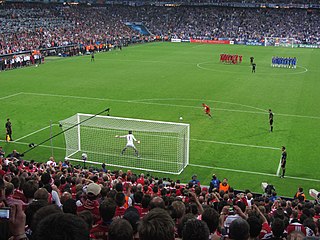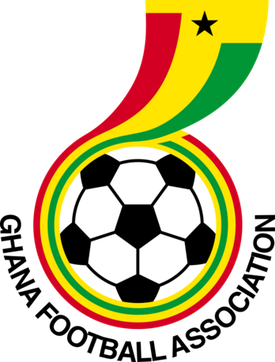
The Italy national football team has represented Italy in men's international football since its first match in 1910. The national team is controlled by the Italian Football Federation (FIGC), the governing body for football in Italy, which is a co-founder and member of UEFA. Italy's home matches are played at various stadiums throughout Italy, and its primary training ground and technical headquarters, Centro Tecnico Federale di Coverciano, is located in Florence. Italy are the reigning European champions, having won UEFA Euro 2020.

A penalty shoot-out is a tie-breaking method in association football to determine which team is awarded victory in a match that cannot end in a draw, when the score is tied after the normal time as well as extra time have expired. In a penalty shoot-out, each team takes turns shooting at goal from the penalty mark, with the goal defended only by the opposing team's goalkeeper. Each team has five shots which must be taken by different players; the team that makes more successful kicks is declared the victor. Shoot-outs finish as soon as one team has an insurmountable lead. If scores are level after five pairs of shots, the shootout progresses into additional "sudden-death" rounds. Balls successfully kicked into the goal during a shoot-out do not count as goals for the individual kickers or the team, and are tallied separately from the goals scored during normal play. Although the procedure for each individual kick in the shoot-out resembles that of a penalty kick, there are some differences. Most notably, neither the kicker nor any player other than the goalkeeper may play the ball again once it has been kicked.

The Spain national football team has represented Spain in men's international football competitions since 1920. It is governed by the Royal Spanish Football Federation, the governing body for football in Spain.
The away goals rule is a method of tiebreaking in association football and other sports when teams play each other twice, once at each team's home ground. Under the away goals rule, if the total goals scored by each team are equal, the team that has scored more goals "away from home" wins. This is sometimes expressed by saying that away goals "count double" in the event of a tie, though in practice the team with more away goals is simply recorded as the victor, rather than having additional or 'double' goals added to their total.

The Ghana national football team represents Ghana in men's international football. The team is named the Black Stars after the Black Star of Africa in the flag of Ghana. It is governed by the Ghana Football Association, the governing body for football in Ghana. Prior to 1957, it played as the Gold Coast.
The FIFA Beach Soccer World Cup is an international beach soccer competition contested by the national teams of the member associations of FIFA, the sport's global governing body. The tournament was preceded by the Beach Soccer World Championships established in 1995 which took place every year for the next decade under the supervision of Beach Soccer Worldwide (BSWW) and its predecessors. FIFA joined hands with BSWW in 2005 to take over the organization of the competition, re-branding it as an official FIFA tournament.

Beach soccer, also known as beach football, sand football or beasal, is a variant of association football played on a beach or some form of sand.
The Beach Soccer World Championships was the premier international beach soccer competition contested by men's national teams between 1995 and 2004. It was replaced by the FIFA Beach Soccer World Cup.

The 1994 FIFA World Cup final was a soccer game that took place at the Rose Bowl in Pasadena, California, United States, on July 17, 1994, to determine the winner of the 1994 FIFA World Cup. Brazil beat Italy 3–2 on penalties to claim their fourth World Cup title when the game finished 0–0 after extra time; this was the first new FIFA World Cup Trophy for Brazil, as their previous three trophies were secured as Jules Rimet Trophy.

The Democratic People's Republic of Korea women's national football team represents North Korea in international women's football.

The Netherlands national football team has represented the Netherlands in international men's football matches since 1905. The men's national team is controlled by the Royal Dutch Football Association (KNVB), the governing body for football in the Netherlands, which is a part of UEFA, under the jurisdiction of FIFA. Most of the Netherlands home matches are played at the Johan Cruyff Arena, De Kuip, Philips Stadion and De Grolsch Veste.

The Israel national beach football team represents Israel in international beach soccer competitions and is controlled by the IFA, the governing body for football in Israel.
The Brazil Olympic football team represents Brazil in international football competitions during Olympic Games and Pan American Games. The selection is limited to players under the age of 23, except three overage players. The team is controlled by the Brazilian Football Confederation (CBF). Brazil U23 is one of the most successful teams in the Olympic football tournament, having won it twice.
The 2007 FIFA Beach Soccer World Cup Final took place between Mexico and Brazil on 11 November 2007 at Copacabana Beach, Rio de Janeiro. Brazil were the winners, winning by eight goals to two. Brazil have beaten fifteen other teams to be crowned 2007 FIFA Beach Soccer World Cup Winners. It was Brazil's second title in a row.
The 2011 FIFA Beach Soccer World Cup Final was the last match of the 2011 FIFA Beach Soccer World Cup which took place on September 11, 2011 at the Stadio del Mare, in the Italian city of Ravenna. The final took place between Russia, who were taking place in their first ever final and defending champions Brazil, who were playing in their fourteenth final, aiming to win their fourteenth title. The result of the match saw Russia claim the FIFA Beach Soccer World Cup crown, winning their first ever title and becoming only the third team other than Brazil to win the World Cup.
The knockout stage of the men's football tournament at the 2016 Summer Olympics was played from 13 to 20 August 2016. The top two teams from each group in the group stage qualified for the knockout stage.

The 2017 FIFA Beach Soccer World Cup Final was the last match of the 2017 FIFA Beach Soccer World Cup which took place on May 7, 2017 at the National Beach Soccer Arena in Nassau, the Bahamas. The final was contested between Tahiti, who had previously competed in one World Cup final, the last World Cup final in 2015 which they lost to Portugal, and Brazil, who were back into a World Cup final after their last appearance six years ago in 2011, their sixth FIFA Beach Soccer World Cup final and their 15th overall when taking into account the pre-FIFA era Beach Soccer World Championships, beating the defending champions Portugal on their way to this year's final.
The following were the events of association football for the year 2019 throughout the world.










